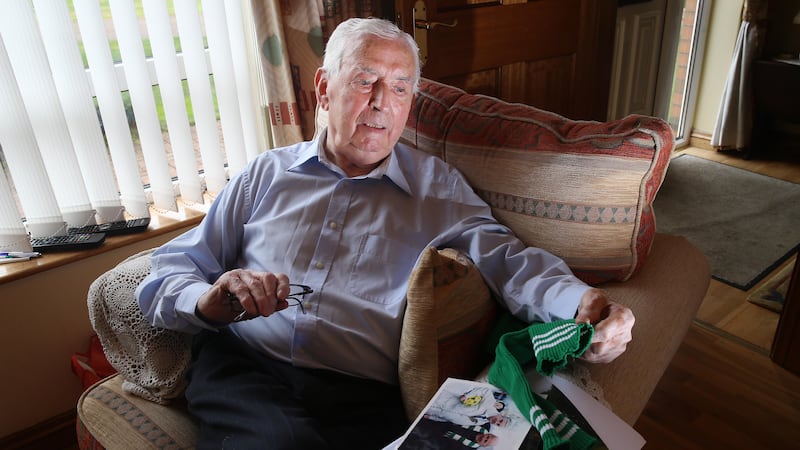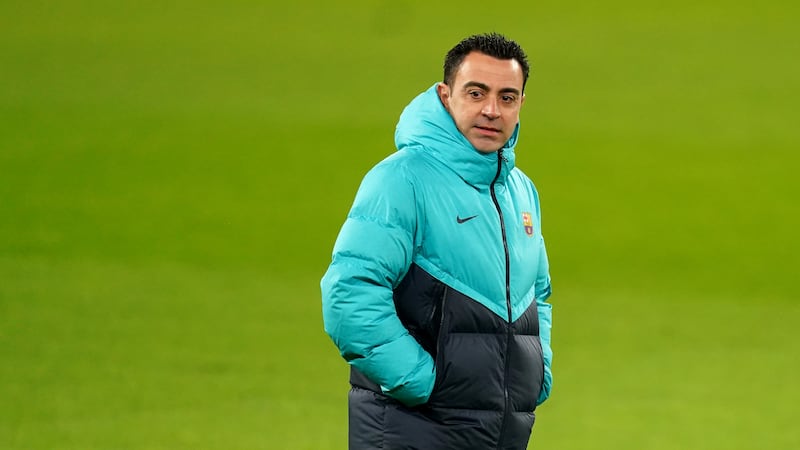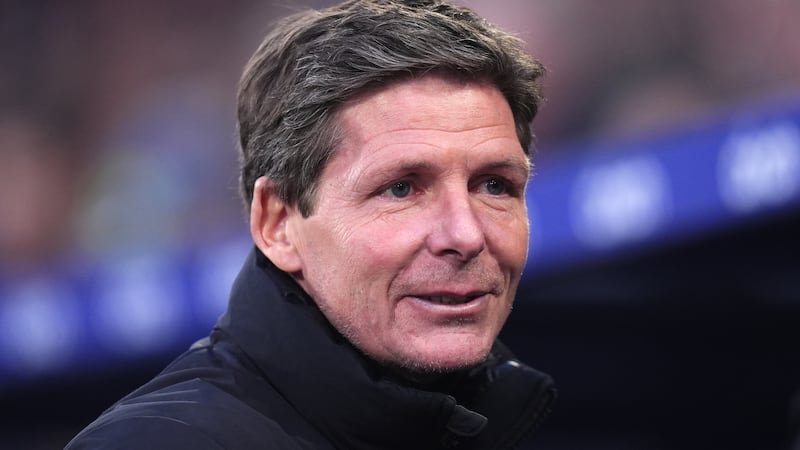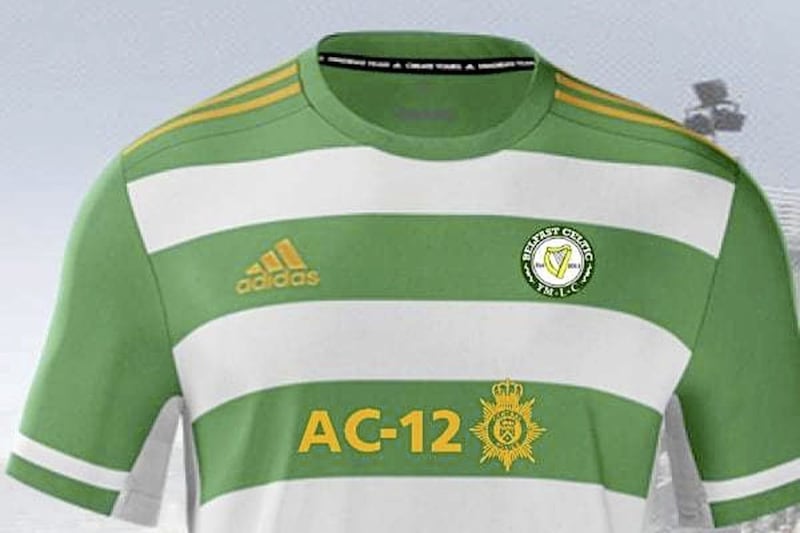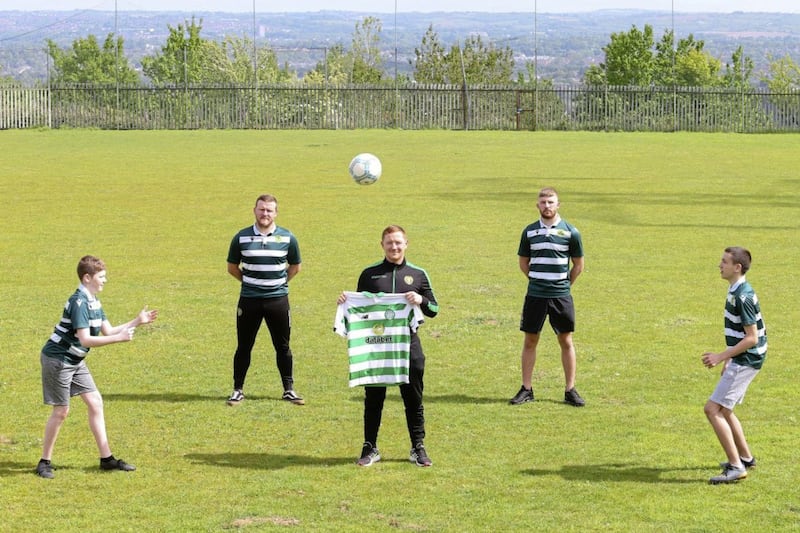TEN-BOB a game playing for Belfast Celtic’s reserves meant teenage Jimmy Donnelly was on to a good thing in the late 1940s. Always his own man, Jimmy skippered Antrim minor hurlers in two All-Ireland semi-finals yet incurred the wrath of the GAA for playing ‘foreign sports’ by featuring for the storied west Belfast soccer team he supported as a boy. Celtic sadly disappeared forever in 1949, but their memory lives on. Jimmy, one of the club’s last surviving players, reflects on his sporting life with Andy Watters....
AW: Was soccer your first love? You played GAA too?
JD: I captained the Antrim minor hurling team in two All-Ireland semi-finals 1945/46 and 1946/47 and we played Dublin both times. One year it was at Croke Park and the next year it was at Corrigan Park. Many years later I was at an accountants’ do in Dublin and I met a fella called Liam Donnelly. It turned out I had played against him and he was the captain of the Dublin team. There was a photograph in the paper ‘The Donnellys lead the way’ when we were parading around Croke Park.
AW: Like many talented Gaels, you were lured away by soccer. How did that happen?
JD: I turned up one night at a match in Ballymena and the Celtic reserves were short a man Dr Kevin McGarry didn’t turn up. There was nobody else there only an oul’ fella about 40 called Charlie Murphy who looked after the reserve team and I went down and played and scored two goals.
AW: Were you a fan of the club?
JD: I was and I knew a lot of the boys there Charlie Tully, Tommy Breen was a neighbour of mine and Sean McCann, the goalkeeper, lived next door to me. The goalkeeper of the reserves was a fella called Cunningham and he brought me straight up to Celtic Park and I met the famous Elisha Scott (former Liverpool goalkeeper and manager of Belfast Celtic between 1934 and 1949). He said to me, we have a motto: ‘If you are a good player and of good character, we’ll sign you’. I ticked both boxes. With the reserves you got 10-bob (10 shillings) a match, a clean 10-bob note I think it must have been laundered (laughs). It was in your boot when you came back out after a match because you weren’t supposed to be paid as an amateur.
AW: Was that good money at the time?
JD: Oh God aye! I was only earning 7-and-6 (seven shillings and six pence) a week to train as an accountant. Near the end of the season they had to catch up on their fixtures so you got maybe three matches that would have been three 10-bobs so you could have taken a girl out. I was very popular!
AW: Was it difficult to become established as a Celtic player?
JD: I played the best part of two seasons at Celtic. I played a couple of friendly matches for the first team, but I was only 17 at the time. A disagreement with Charlie Murphy, who was manager of the second team, didn’t help, but I played half-back and you would never have got on the Celtic first team because Harry Walker was there from the 1930s right to 1949 when they disbanded. He was the man I would have to displace. He was a good one, a lovely man and an excellent player. He only got one international cap and that was sitting on the bench against Wales, but he was well worth a lot more.
AW: You were at the infamous Windsor Park match in 1949 that ended with a riot that left your friend Jimmy Jones badly injured?
JD: Jimmy had his leg broken. I was sitting up in the stand and I was near Sean McCann who played in the second team and when he saw it (the assault on Jones) happening he went down and lay across Jimmy as a policeman said: “If you don’t stop kicking him I’ll have to draw my baton”. It was terrible.
AW: That marked the end for Celtic, but there was still the famous win over Scotland...
JD: Celtic played out the rest of the league and the tour of the USA had already been arranged. They beat Scotland, who were home international champions. They stayed in the same hotel and wouldn’t speak to them because they were only a club team Celtic duffed them 2-0 and the Scots asked for a replay, but the wily Elisha Scott said ‘no, you’ve had one bite at the cherry’.
AW: The club folded in 1949 and you were one of three youngsters left after the senior players were sold. You rejected a move to Crusaders?
JD: I was supposed to go with Vinny Morrison, from Derry, and Leo McGuigan. They were giving me to Crusaders on the condition that if there was a transfer after that they would receive a third and Belfast Celtic would get two-thirds, but I had already gone at that stage. I had a bit of a difference with Charlie Murphy who was manager of the seconds and it was coming near the end of the season. Longford Town asked me to play for them so I signed for them and I enjoyed my time there.
AW: Where did you play after Longford Town?
JD: I was suspended by the GAA for playing that terrible game, that foreign game called soccer. There was this great young GAA team going in Belfast called Granuaile, they played in Andersonstown and this fella decided that I should play, so I did and they won the intermediate league among many trophies including the Beringer Cup. They were promoted to the senior league and my first match was against Rossa and, of course, that was the end of it. There were that many soccer and rugby and hockey players on the team that the club was disbanded because the players were all suspended. They were all involved in ‘foreign sports’.
AW: Was that the end of your sporting career?
JD: No, Fr O’Sullivan and myself formed Malachians FC and I played with them until I broke my leg I was still playing five-a-side football at St Malachy’s College up until about five years ago.
AW: What about life away from football?
JD: I was concentrating on my accountancy practice when I got involved with Newcastle United as a representative through Jackie Milburn (Newcastle and England star and cousin of Jack and Bobby Charlton) and I was with them for about 20 years. Jackie was a client of mine in my accountancy business and I had played a friendly match with him. He was a lovely fella, he lived in Holywood and he played for Linfield. He was discarded by Newcastle and he got his compensation of £750 as an injured player. He was a star player in Irish football then.
AW: You unearthed a few diamonds (including the managers of Ireland’s international soccer sides)?
JD: I was the one who discovered Martin O’Neill and Michael O’Neill. Martin was at St Malachy’s College and I knew his father well because he played for St Gall’s in hurling and I played for Rossa and he asked me to come down and see this lad of his who was playing for Coleraine reserves. I went down to see him he was a long, spindly fella. I recommended him to Newcastle but they took their time about doing anything and they missed their chance. He went to Nottingham Forest for £4,500 and Newcastle wanted to sign him the following year and Brian Clough was looking for £75,000.
AW: Are you still involved in football?
JD: I wasn’t well a couple of years ago and I had a couple of operations that put an end to my five-a-side career. I played well into my 70s. I enjoyed the craic and I kept myself very fit.
AW: Do you think Belfast Celtic could ever come back?
JD: We had a ‘Johnny Campbell Benefit Match’ in 1968 sponsored by Malachians and we had about 5,000 people turn up at Celtic Park singing ‘It’s a grand old team to play for’. It was old Belfast Celtic versus an Irish League team. Old Belfast Celtic won 7-0 and Jimmy Jones scored all seven. At that time there was talk about bringing Belfast Celtic back and there was a meeting in Sam Casey’s bar. Malachians could have got Celtic Park to play any of their matches and it was a beautiful pitch at that stage, although the pipes were rotten in the place and so on. They talked about it, and Fran Fields, who was chairman of the League of Ireland, said he could get them back in the League of Ireland. Malcolm Brodie said he could get them back into the second division of the Scottish League. Then ‘the Troubles’ came and a lot of the talking faded into the background, a pity. There was a reunion in 1989 and there was talk about reviving it, but it never came to anything. They thought that Donegal Celtic could take their place, but there was no way.
AW: When Celtic Park was put on the market the last hope evaporated?
JD: The ground was sold for £200,000. At one time when the Antrim GAA were moving from Corrigan Park to Casement Park, it was said they were offered the ground and they wouldn’t take it. Maybe they didn’t want any interference from the soccer world. At Celtic Park there was parking for 2,500 cars and now at Casement Park or Windsor Park there’s not room for half-a-dozen!
AW: Was something precious lost when Belfast Celtic went out of business?
JD: There’s a saying: ‘For the green flag flies lonely and the best of friends must part, for no more we’ll stand and cheer you from the slopes of Celtic Park.’ That is all about the vacuum that was left when they went out of football. It was the end of an era. When we had nothing we had Belfast Celtic and when we had Belfast Celtic we had everything.
